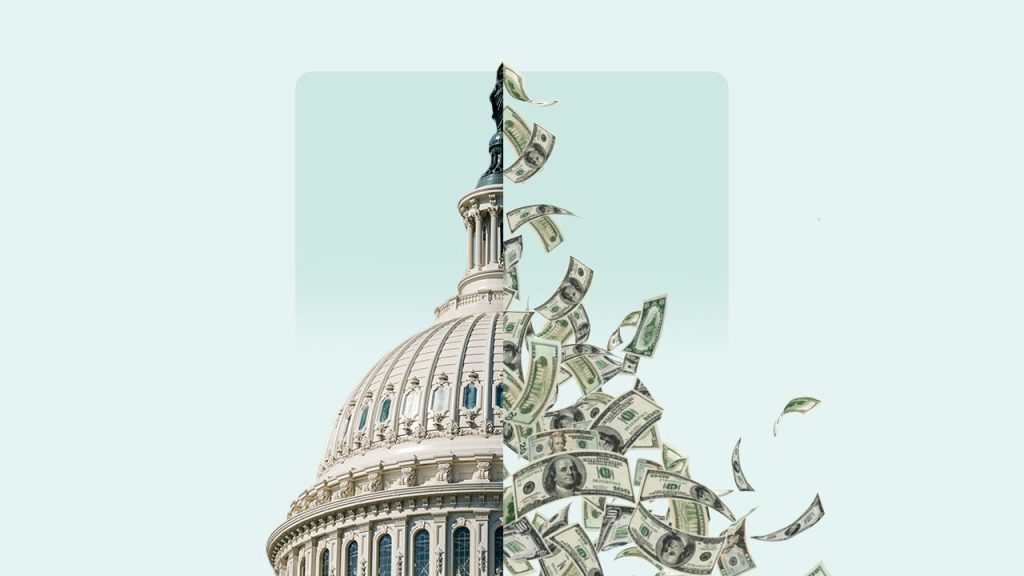Key takeaways
- Governments often borrow money to cover deficits when taxes and other revenues don’t cover expenses. The national debt is the total amount of money a country’s government owes to its creditors.
- A higher national debt can affect personal debt through increased interest rates, reduced benefit programs and potential tax increases.
- Regardless of the national debt, prudent personal debt management can help to protect you and your family financially.
Since the turn of the millennium, the U.S. national debt has grown from $5.6 trillion to $36 trillion. This means America currently owes $36 trillion to its creditors — around $106,000 per American.
While individual Americans aren’t responsible for repaying “their share” of the debt, the increasing national debt indirectly impacts personal household debt in multiple ways. Understanding the connection between the national debt and personal debt can help you protect your financial interests and prepare future generations to manage debt responsibly.
Basics of the national debt
The national debt grows when the government borrows money to cover the difference between the revenue it collects (such as taxes) and the amount it spends.
This money can be borrowed from foreign investors or other governments. The government can also borrow from its own citizens through the sale of government-backed securities, such as government bonds and treasury bills.
National debt vs. budget deficit
The national debt and budget deficit are closely related, but they are not exactly the same thing.
A budget deficit occurs when spending exceeds revenue in a given fiscal period, typically a year. The national debt is the aggregate of the annual deficits.
If we were to see a surplus (meaning the government had more revenue than expenses) instead of a deficit in a given year, that amount could be used to help pay down the national debt.
Factors contributing to the growing national debt
If controlling the national debt is simply a matter of the government consistently spending less than it earns in revenue, why does the national debt keep growing? Why can’t we “balance the budget” to create annual surpluses to pay down the debt?
As you may have seen with your own finances, creating a budget surplus isn’t always easy. Situations are quickly complicated when dealing with an entity the size of the U.S. government.
Here are the primary factors contributing to the growth of the national debt.
Changing demographics
Tax revenue is being squeezed at both ends of the age spectrum in America. The expansive baby boomer generation is retiring and paying less in income taxes while claiming the social benefits they were promised (such as Medicare).
At the same time, the birth rate is down, resulting in fewer up-and-coming workers to pay the taxes needed to cover governmental expenses.
Increased government spending
Expenses related to programs like Medicare, Medicaid and national defense have grown significantly in recent years. However, unexpected events like wars, natural disasters, infrastructure repairs and public health crises cause serious financial strain that is more difficult to prepare for. Spending is often necessary to minimize loss of life and reduce the long-term financial impact of the event.
Economic downturns
Recessions reduce tax revenue due to lower income and corporate profits. However, they also require spending increases on unemployment benefits and stimulus measures to sustain and improve the economy.
For example, increasing infrastructure expenditure during a recession can create jobs, which can provide an economic boost and increase income tax revenue.
Tax cuts without offsetting revenue
Taxes are a delicate balance. Higher tax rates create more tax revenue, but they also reduce the amount of disposable income households can circulate through their local economies. Offering tax cuts without having a plan to recover those losses will create a deficit and contribute to an increasing national debt.
Rising interest costs
In the same way you pay interest on your loans and credit cards, the government must pay interest on its debts. As debt grows, so does the cost of servicing it. Higher interest rates make it more difficult to get out of debt.
5 ways the national debt affects your personal finances
Although you don’t have to pay off government debt directly, its effects trickle down to your wallet. Here are five key ways the national debt can affect your personal debt.
1. Increased interest rates
When national debt grows, the government may borrow more from financial markets, increasing competition for credit. This can lead to higher interest rates on loans such as home mortgages, auto loans and credit cards for everyday Americans.
2. Reduced government benefits and programs
High debt levels may force the government to cut spending on programs related to healthcare, education and infrastructure, which could impact personal financial security.
For example, less funding for federal student loans could force students to take higher-interest private student loans or bypass higher education entirely, potentially resulting in lower earning power throughout their careers.
3. Potentially higher taxes
The government may have to increase taxes to balance the budget or pay down the national debt. This would reduce the amount of disposable income available to individuals and families.
4. Less investment for the future
Managing the national debt reduces the amount of funding available for “optional” public projects, like roads, schools and research. This leaves Americans with the option of foregoing those investments in the future or paying private companies to provide those services.
5. Market volatility
Concerns over debt sustainability can create financial market instability. We’ve already seen the credit rating for the American government downgraded from AAA to AA+, indicating lower global confidence in America’s ability to repay debts (although AA+ is still an exceptionally strong rating). Market volatility can affect individual investments, including retirement accounts and stock portfolio performance.
How to manage your personal debts regardless of the national debt
Managing personal debts becomes even more critical when considering the broader economic challenges posed by America’s national debt, as it can impact interest rates, inflation and overall financial stability.
Here are 10 tips to help you manage your personal debt given the increasing national debt.
1. Create a budget and stick to it
A clear budget helps you allocate your income to expenditures that are most important to you. Track your income and expenses monthly to make sure you’re following your budget.
2. Pay off high-interest debt
Paying off high-interest debt, such as credit cards, saves you money by reducing the amount of interest you have to pay each month and lowering your overall interest expenses over time.
3. Build an emergency fund
An emergency fund saves you money by enabling you to use savings to cover unexpected expenses instead of borrowing money and paying interest on that debt. If you can save three to six months’ worth of living expenses, you’ll have enough to cover the most common unexpected expenses. This amount can also buy you time to find a new job in the event of a layoff.
4. Consolidate or refinance overwhelming debt
If you’re carrying more debt than you can handle, consider consolidating or refinancing to get more manageable repayment terms. Consolidating multiple debts into a single, lower-interest loan can simplify your finances while potentially reducing your overall interest expense. Refinance existing loans may allow you to reduce your monthly payments through a lower interest rate, longer loan term or both.
5. Limit your new debt
Exercise caution when considering new loans or credit card use, especially in uncertain economic conditions. While financial leverage can be useful in buying a home, getting a college degree or starting a business, excessive borrowing can harm your budget and your credit score.
6. Make extra payments toward your debt balances when possible
Small financial windfalls (like a bonus or tax refund) can be used to pay down your debt faster. The faster your debt is repaid, the sooner you can allocate those monthly payments to something else, and the less you’ll pay in total interest expenses.
7. Be aware of rising interest rates
Rising interest rates can make borrowing more expensive and limit your ability to repay debts. Locking in low interest rates through fixed-rate loans can protect you against future interest rate increases.
8. Diversify your income sources
Consider side hustles or passive income streams to increase your financial resilience. Diversifying your income sources can help protect you if your primary income source disappears. It can also give you more disposable income for paying down debt, expanding your investment portfolio or enhancing your lifestyle.
9. Invest wisely
A more conservative investing approach may be appropriate in times of economic uncertainty. If national debt concerns lead to economic instability, you may want to balance your long-term growth strategy with low-risk investments.
10. Seek professional advice
A financial advisor or credit counselor can help you create a plan to manage your debts, improve your credit or grow your portfolio despite changes in the national debt.
The bottom line
The growing national debt can affect the personal debt of Americans through fluctuations in interest rates, changes in government-provided benefits, increased market volatility and potential tax hikes.
Personal debt management is always important, but it’s even more so when the national debt is growing. You can protect your financial interests through effective personal debt strategies like paying off high-interest debt, establishing an emergency fund and diversifying your income.
Frequently asked questions
Read the full article here












